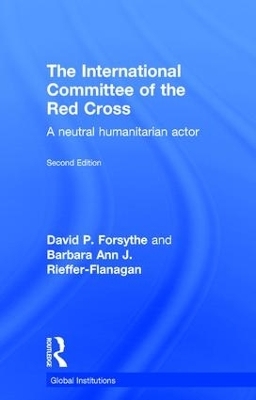
The International Committee of the Red Cross
A Neutral Humanitarian Actor
Seiten
2016
|
2nd edition
Routledge (Verlag)
978-1-138-18552-4 (ISBN)
Routledge (Verlag)
978-1-138-18552-4 (ISBN)
Written by two formidable experts in the field, this book analyzes international humanitarian action as practiced by the ICRC, explaining its history and structure as well as examining contemporary field experience and broad diplomatic initiatives related to its principal tasks.
The International Committee of the Red Cross (ICRC) has a complex position in international relations, being the guardian of international humanitarian law but often acting discretely to advance human dignity. Treated by most governments as if it were an inter-governmental organization, the ICRC is a non-governmental organization, all-Swiss at the top, and it is given rights and duties in the 1949 Geneva Conventions for Victims of War.
Written by two formidable experts in the field, this book analyzes international humanitarian action as practiced by the International Red Cross, explaining its history and structure as well as examining contemporary field experience and broad diplomatic initiatives related to its principal tasks. Such tasks include:
ensuring that detention conditions are humane for those imprisoned by reason of political conflict or war
providing material and moral relief in conflict
promoting development of the humanitarian part of the laws of war
improving the unity and effectiveness of the movement
Fully updated throughout, the new edition will also include brand new material on:
armed actors who do not accept humanitarian restrictions on their actions, including expanded coverage of the Islamic State (ISIL, ISIS), Al Shabab, and Boko Haram, among others
Syrian internationalized civil war
issue of drone strikes and targeted killings, and the continuing push for regulation of what is called cyber war
the question of the field of application of international humanitarian law (what is the battlefield?). Particularly when states declare "war" on "terrorist groups" operating inside other states
regulation of new weapons and new uses of old weapons
The International Committee of the Red Cross (ICRC) has a complex position in international relations, being the guardian of international humanitarian law but often acting discretely to advance human dignity. Treated by most governments as if it were an inter-governmental organization, the ICRC is a non-governmental organization, all-Swiss at the top, and it is given rights and duties in the 1949 Geneva Conventions for Victims of War.
Written by two formidable experts in the field, this book analyzes international humanitarian action as practiced by the International Red Cross, explaining its history and structure as well as examining contemporary field experience and broad diplomatic initiatives related to its principal tasks. Such tasks include:
ensuring that detention conditions are humane for those imprisoned by reason of political conflict or war
providing material and moral relief in conflict
promoting development of the humanitarian part of the laws of war
improving the unity and effectiveness of the movement
Fully updated throughout, the new edition will also include brand new material on:
armed actors who do not accept humanitarian restrictions on their actions, including expanded coverage of the Islamic State (ISIL, ISIS), Al Shabab, and Boko Haram, among others
Syrian internationalized civil war
issue of drone strikes and targeted killings, and the continuing push for regulation of what is called cyber war
the question of the field of application of international humanitarian law (what is the battlefield?). Particularly when states declare "war" on "terrorist groups" operating inside other states
regulation of new weapons and new uses of old weapons
David P. Forsythe is Emeritus University Professor and Charles J. Mach Distinguished Professor of Political Science at the University of Nebraska –Lincoln, USA. Barbara Ann J. Rieffer-Flanagan is Professor of Political Science at Central Washington University, USA.
Introduction 1. Historical development 2. Organization and management 3. The ICRC and international humanitarian law 4. Humanitarian assistance and restoration of family ties 5. Detention visits 6. Conclusion: the future of the ICRC
| Erscheinungsdatum | 29.06.2016 |
|---|---|
| Reihe/Serie | Global Institutions |
| Zusatzinfo | 3 Tables, black and white |
| Verlagsort | London |
| Sprache | englisch |
| Maße | 138 x 216 mm |
| Gewicht | 317 g |
| Themenwelt | Recht / Steuern ► EU / Internationales Recht |
| Sozialwissenschaften ► Pädagogik ► Sozialpädagogik | |
| Sozialwissenschaften ► Politik / Verwaltung | |
| Sozialwissenschaften ► Soziologie | |
| Wirtschaft | |
| ISBN-10 | 1-138-18552-3 / 1138185523 |
| ISBN-13 | 978-1-138-18552-4 / 9781138185524 |
| Zustand | Neuware |
| Haben Sie eine Frage zum Produkt? |
Mehr entdecken
aus dem Bereich
aus dem Bereich
Grundlagen - Konzepte - Methoden
Buch | Softcover (2023)
Kohlhammer (Verlag)
CHF 47,60
ein Lehrbuch zum Kita-Management
Buch | Softcover (2023)
Kohlhammer (Verlag)
CHF 64,40
Orientierungswissen für die Soziale Arbeit
Buch | Softcover (2024)
Kohlhammer (Verlag)
CHF 49,95


